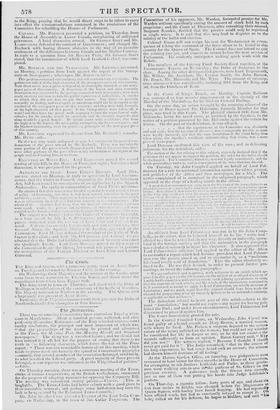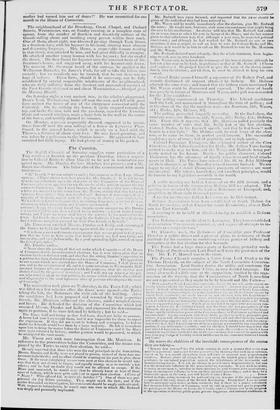In the Court of King's licnrh, on AIonday, Captain Robison
was sentenced to four months' imprisonment in the custody of the Alarshal of the Alarshalst a, fur his libel on General Darling. On the same day, an action brought by the returning officer of the borough of Dover against Al r. I1 ticumhc, f:ormerly Alt inlan. for that place, was tried in this (nwt. The plaintiff claimed :NIL from AIr. Holcombe, being his taxed costs, as certified by the Speaker, in the matter of a petition presented by AIr. Holcombe against the return for Dover. On the part of the defendant, it was alleged,
that the appointment of the Committee was absolutely
111111 and void ; that the tax...thin of the cuts was cynserinently invalid, as none were legally incurred; and that the very foundation of the claim being thus taken away, the Speaker's certificate authenticating that claim, was a mere pyre of waste paper.
Lord Denman confirmed this view of the case; and in delivering judgment, fur the defendant, said- Tbe section of the Act relating to this subject, expressly 'declared that if the petitioner did nut appear to support the ',anion, the order for the ballot should be discharged. The Committee, therefoie, was not legally constituted ; and the whole proceedings under it, ziad in eon-anal:nee of it, were therefore invalid.
On Tuesday, Sir John Campbell applied on behalf of Lord Pal- merston for a rule for a criminal information against the editor, printer, and publisher of the Albion (111.1 Slar newspaper, for a libel. The matter complained of is contained in the subjoined paragraph, which
appeared in the shape of a leading ertiele in the alThion.
"A anent deal of conversation is going on at the West end of the town 'relative to an allonst aocovery el a uotaa toot., eanuasion , Speett• litiiellS. It is arlirny,.1, that ruhou tne inies.n.atioo or try• alr;,ir, et en,: ul the 1,,,,es iu the City who re.ibl mot !noel lux en::ag:ineats nth the last 'bett..1114 dal at the i.:11 Stiwk Exeit:inge, it raced wit that hi: emplo■ors. ,qt Clare leas 5/ Ia. no I -s tl,ut was ”Is all per-u;0 iu tla• kin::;dom the ought to hat, 1,0,11 ■• m.elh,l in ton•i.ol st ot.1: spoci,1 t:hol,. NV e iii tot. the It,,twur t;”•,,ottitry mil its t;..Norn::_.•:,t. tear t!.0 runt■ttn, this 1%111 ;it it Ile hi the ut..ii time. v.,. rail St,t'rely tr",o not nmt.,•1: It ,,t, I the ...Ili, the .I .I! (In ,,e it: an; utly roam c'ea with 111..m. It 1,11.4 1,41:4 sinco
t.i 1,py ■.■ iii,n1p.r.try a hut. pi.!t■ v.:truing
a:!ai:1-1 licedy or high ollh•ial ih.lor:atay stut %wry.. v,•;•■• low at the time shut had tionlit a. tel 1:1::e awl ec the inili‘itItal F"ha:el zit. It 5. ill be ettrious e‘■•tits have IA-I-11 ore,v.to.1, sull1;•:•10 to 1,11,1e Ii■AV there cos Ile the temmk."
aln atli.lavit from Lord Palmer, ton was put in by Sir John Camp- hell,—to the effect, that lie believed himself to be the " noble lord" alluded to ; that he i:ever had, in any way, directly or indirectly, specu- lated in the foreign stmt :s ; end that the insinuation in the paragraph was calettlnit:d seriously to injure his character. It also appeared that Lord l'alinerston's solicitors had applied to the editor of the AlGintt to cointadiet a report which had Income prevalent that Lord Palmer- sten was the person aimed at, arid to stigmatize it, as a "malicious filschood totally void of foundation." This the editor absolutely re- fused to do. Ile was then d: sired, in order to prevent further pro- ceedings. to insert the following paragraph- " Keane authorised and requested, 'with reference to an article which ap- pear, d in this paper an the t.1tli Mstant, on the sul:j.:et of an alleged discovery of a noble lord's connexion with ell recant stock- jobbing nt-, to state, that the contents of such article, and the whole of the insinuations contained in it, if considered as meant tat apply to Lod PahnerstOn, are wholly deditute of foundation; and we much regret that this jotirnal should have been made the channel for propagating what we siaurely believe to be an unfounded calumny, as applicable to that m10011;1;1." The defendant offered to insert hart of this article—down to the word " foundation ;" but would not express any regret for having pub- lished the libel ; and under these circumstances, Lord l'almerston had determined to proceed against him. The Court immediately- granted the rule. In the Central Criminal Court, on Wednesday, John Cassel was found guilty of a brutal assault on Mary Brown, a married woman, with whom he lived. Mr. l'aiker, a surgeon, deposed to the serious nature of the injury inflicted on the woman ; but could not say whether be considered her life in danger or not, as lie did not examme the wounds sufficiently to form an opinion. Baron Gurney said, " Why did you not?" 'I he witness replied, " Because I thought I should never get paid for it." The Judge remarked, " that in the course of his long experience, he had never heard such an answer; the witness had shown himself destitute of all feeling." At the Hatton Garden Office, on Saturday, two pickpockets were sentenced to hard labour for three months in the House of Correction, for attempting to rob Justices Littledale and Parke, as these gentle- men were walking arm-in.arrn in•the purlieus of St. Giles's on the previous evening. A policeman took the thieves into. custody, just as one of than was putting his hands into Judge Lath:dole's pockets. On Thursday, a gigantic fellow, forty years of age, and about sit feet four inches in height, was charged before the Magistrates at 1.,!tieen Square, with having been found begging. He bad repeats: _ y been offered work, but had as constantly rePased to accept .0.m being called on for his defence, be began to blubber, and said "bA
mother bad turned him out of doors !" He was committed for one month to the House of Correction.



























 Previous page
Previous page